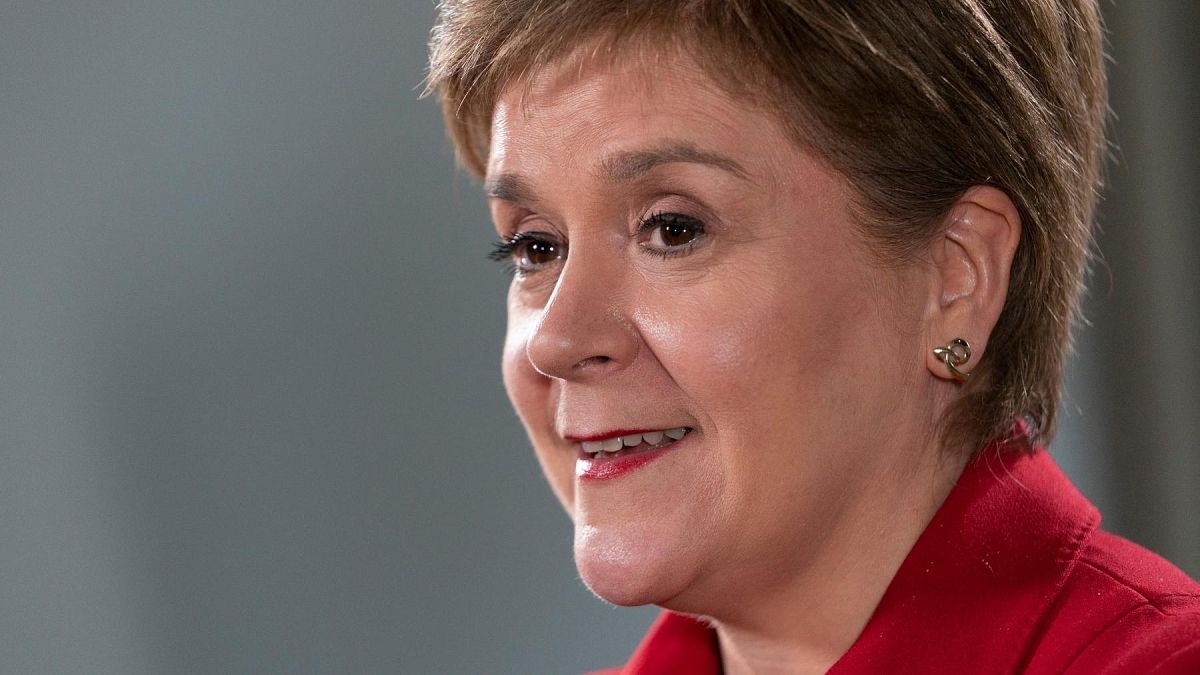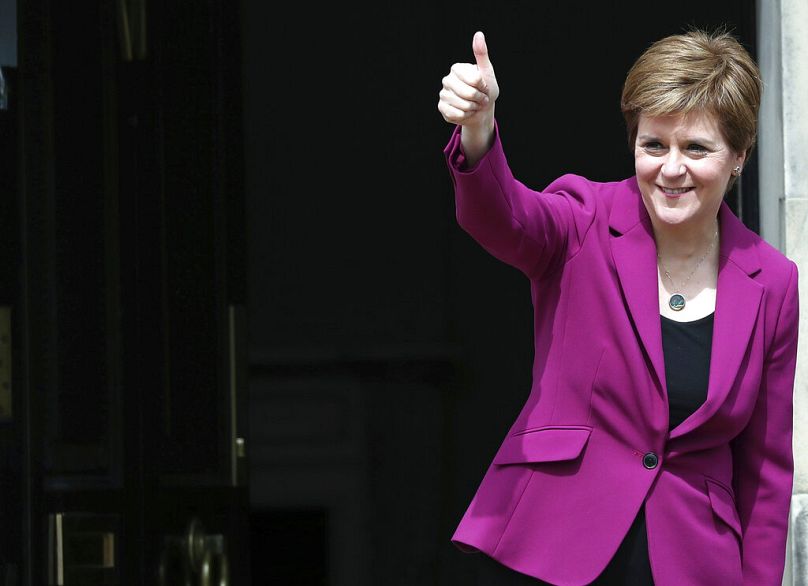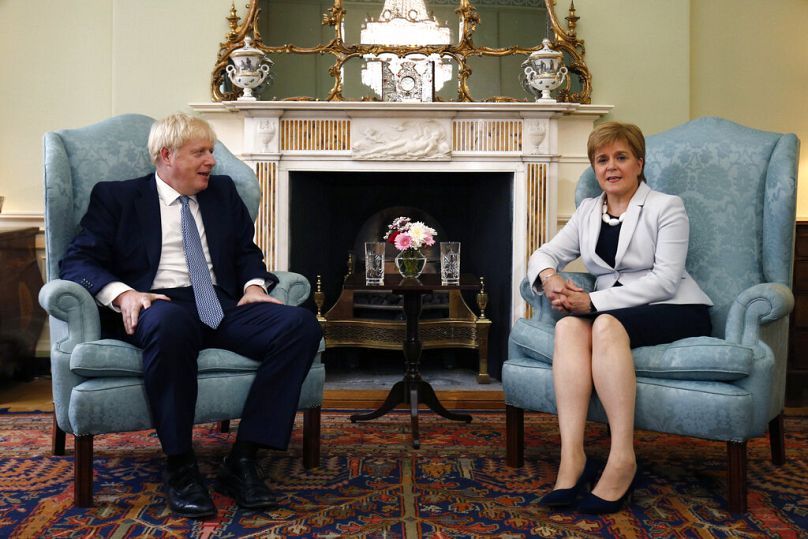Nicola Sturgeon passes her predecessors this week to become Scotland's longest serving first minister - and plans to hold a new independence referendum in 2023.
Nicola Sturgeon should be enjoying a landmark week in her political career as she becomes Scotland's longest-serving First Minister.
Instead, she's been suffering from a bout of COVID that really "knocked her for six" since coming back from a working visit to the US.
With seven years and 187 days in office under her belt, Sturgeon has now outlasted her predecessors, Scotland's early Labour Party First Ministers Donald Dewar, Henry McLeish, Jack McConnell - and the man who led Scotland into the 2014 independence referendum, her former friend and one-time mentor Alex Salmond.
Sturgeon is still planning to hold a fresh referendum in 2023, recently repeating the mantra that her government has a "very firm mandate" to do so.
And it's true: the Scottish National Party won an extra seat in the Scottish Parliament elections last year, missing out on an overall majority by just one seat; and in May's local council elections the SNP also increased its number of councillors and share of the vote.
By European standards, it's an enviable position for any ruling party to be in, still comfortably winning elections and riding high in the polls 15 years after it first took power.
So how do Nicola Sturgeon and the SNP do it?
"It's certainly unusual that a party can maintain office for such a long period of time and still not look like losing it any time soon," Dr Malcolm Harvey, a lecturer in politics at the University of Aberdeen, told Euronews.
"Often it comes down to circumstances. If you have a strong economy that tends to keep parties in office longer.
"It also comes down to political competition; if you have an alternative government in waiting that looks like a potential government there's an opportunity for them to take over. Those kind of things really play on voters' minds."
The Scottish government has control over a range of policy areas, while others are reserved for Westminster. This means the SNP can take credit for things within its remit going largely right - like healthcare during the pandemic - and blame the central government in London when things go wrong, for example after Brexit.
In essence, the SNP gets to cherry-pick the bouquets and brickbats to suit its own narrative, while not facing any serious political challenges from a cluster of weak opposition parties with a revolving door of leaders who have rarely registered positively - if at all - in the minds of the voting public.
"The Scottish electorate do tend to give the Scottish parliament credit for things they have done," Dr Harvey said, "or even things they haven't done, and the blame tends to go to the UK parliament and the UK Government if things are going badly."
Is another independence referendum still on the cards?
Despite strong polling and repeated election successes, the SNP hasn't been able to translate its apparent broad support into a sustained surge in support for independence.
So will there really be another independence vote by the end of 2023, as Nicola Sturgeon has promised her party faithful?
Supporters say yes, but others are not convinced.
"In terms of the referendum, the mandate is there, the legislation is coming forward, and I don't see in the medium term how that can be sustainable for the British Government to continue to say no to it," said Martin Docherty-Hughes, an SNP Member of Parliament whose constituency is in the west of Scotland.
Pro-independence critics of Sturgeon, of which there are many, both outside and also inside the SNP, hold that she's got too comfortable in government and has lost the appetite for independence, especially after pushing back plans for another vote until after the COVID crisis.
"I think she is a steady ship, she has been able to ensure the people of Scotland trust not just her but her government, which was re-elected, and has now enabled her to get on with the job in hand which is delivering an independence referendum," said Docherty-Hughes.
Problems for the next independence campaign
There remain a series of pressing issues for the SNP. The first is to somehow convince Boris Johnson's government to grant them the power to call a referendum in the first place, something Downing Street has repeatedly dismissed.
Then, they would need to convince Scottish voters to take that leap, which polling shows they're not rushing to do. Thirdly, there is the problem of Brexit, which has highlighted the need for some kind of border regime between an EU country and the UK on the island of Ireland.
Experts like Dr Malcolm Harvey say there would need to be a similar 'harder border' between England and Scotland if it were to join the EU: a notion that Martin Docherty-Hughes rejects. Any new rules or restrictions on the border would very likely hurt thousands of Scottish businesses who do the bulk of their trading with the rest of Britain.
"The role of the party is to convince as many Scots as possible of the benefits of independence and to turn that into a vote for yes," said Docherty-Hughes. "There is a job at hand.
"There is no illusion in the party, and in the wider 'Yes' movement, which includes not only the SNP but the Green Party and others on the left, that work will have to be done in the campaign to move that dial."
Arguably, campaigning started for the 2014 referendum with polls showing less than 30 per cent support for independence, and it ultimately took 45 per cent of the vote.
In public, the SNP says it can now build on that 45 per cent share ahead of the referendum with a clear campaign that learns from the mistakes made eight years ago. But privately, party activists say there are concerns as to whether 45 per cent is a starting point or a ceiling.
So will there be an 'indyref2' in 2023?
Dr Harvey from Aberdeen University describes this as a "pivotal moment" for the SNP when it comes to holding another referendum.
"For the SNP in a second independence referendum, it's win or bust. The risk is incredibly high, if you lose this one you don't get another chance at it," he stated.
The paradox is that the SNP only wants to have a referendum when it can be won, while the UK government will not grant a referendum when that is the expectation.
It's a political Catch-22, and part of the reason the SNP is saying there should be a referendum next year is because it knows the UK government will reject the demand.
In the eyes of the international community and the voting public alike, anything short of a full partnership and agreement between London and Edinburgh on holding a vote would lack legitimacy.
"It would be a toss of the coin whether they would win it or not," said Dr Harvey. "And neither side wants to take the chance they would lose it."
For the time being Nicola Sturgeon might not be for turning, to borrow a phrase from Margaret Thatcher, on the timing of the next independence referendum.
But the realities of Scottish and UK politics could well mean a referendum date is pushed back a few years further still - with the prospect that a fresh face at the helm of the SNP might be needed by then, a generational change in leadership, in order to get a victory over the line.
"Possibly a refresh is in order, governments do tend to lose their way a little bit when they've been in office for a long period of time," said Dr Harvey.
"I don't see it coming any time soon," Dr Harvey said, "but perhaps if Nicola Sturgeon can't get a referendum next year she might then decide she's had enough and pass on the torch to someone else."



